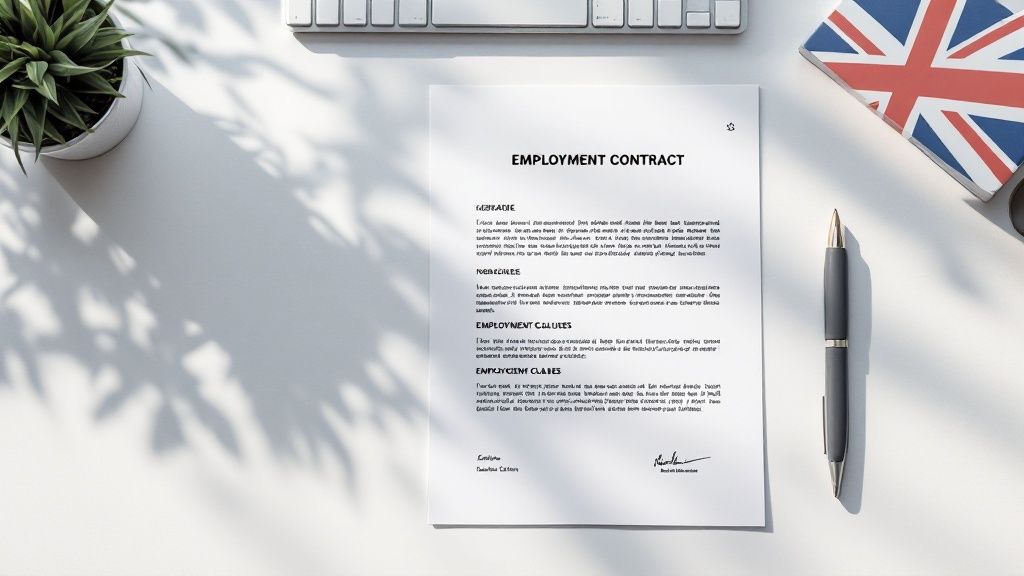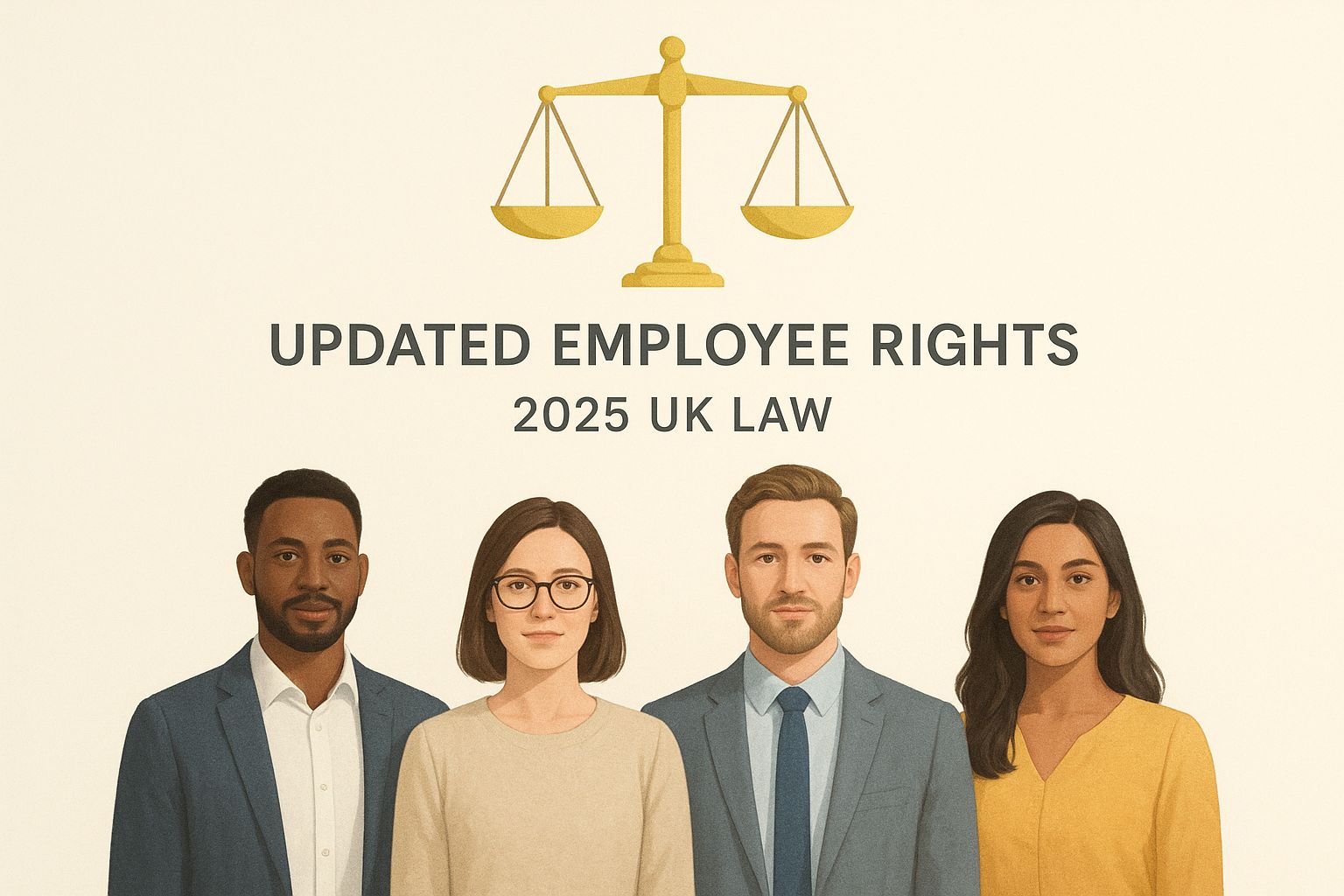
If you’re a UK business owner, 2025 is shaping up to be one of the biggest years for employment law changes we’ve seen in a long time. A raft of new legislation and economic shifts are set to overhaul some of the fundamentals of the employer-employee relationship, from pay and working hours to rights and protections.
For anyone running a business or heading up HR, getting ahead of these changes is about more than just ticking a compliance box – it’s a strategic necessity. The updates hitting in 2025 aren’t just minor tweaks; they’re a series of connected reforms that will genuinely change the working landscape.
Think of this guide as your GPS for the new legal terrain. We’ll map out the key reforms to give you a clear, straightforward view of the road ahead.
The push for these changes comes from a mix of government policy, like the ‘Make Work Pay’ initiative, and a response to ongoing economic pressures. The result is a legislative wave that touches almost every part of running a business with staff. Understanding why these changes are happening gives you the context you need to put them into practice effectively.
So, where do you start? To get ready, you need to know which areas will hit your operations the hardest. We can group the upcoming adjustments into a few main themes, each with its own set of challenges and opportunities.
Here’s a look at the main areas of change:
The sheer volume of new laws means 2025 will be one of the busiest years for UK employment law in over a decade. Being proactive isn't just a good idea anymore; it's essential for avoiding risk and keeping your workforce stable and compliant.
Juggling these shifts takes careful planning and a clear head. For many businesses, especially small to medium-sized ones, the financial and admin load can feel pretty daunting. This is where getting the right advice can make all the difference. As you start figuring out what this means for you, understanding who we help can show you how specialist accounting and payroll support can make this whole process a lot simpler.
Let's walk through each change, one by one, and turn that dense legal-speak into practical steps you can actually use.
To give you a quick overview, we've summarised the most significant legislative updates affecting UK employers from 2025 onwards. This table should help you see the key changes in one place.
Area of ChangeKey UpdateEffective DatePrimary Impact on EmployersNational Minimum WageSignificant increase across all age bands, with the largest rise for the National Living Wage.1st April 2025Increased payroll costs and the need to update budgets and wage structures.Flexible WorkingThe right to request flexible working becomes a 'day one' right for all employees.6th April 2025Must handle requests from new starters and update policies to reflect the change.Carer's LeaveIntroduction of a new statutory right to one week of unpaid leave per year for employees with caring responsibilities.6th April 2025Need to create a new policy for managing and recording carer's leave requests.Predictable Working PatternsNew right for workers on atypical contracts (e.g., zero-hours) to request a more predictable working pattern.September 2025Requires a formal process for considering and responding to requests from eligible workers.Fair Work AgencyEstablishment of a single enforcement body to protect workers' rights and tackle non-compliance.TBC 2025Increased scrutiny and higher penalties for breaches of employment law.
This snapshot covers the headline changes, but as you can see, the impact is broad. Each one will require you to review your contracts, handbooks, and internal processes to ensure you're fully compliant from day one.
Beyond the big-picture legal shifts, the changes hitting your wallet the hardest in 2025 are coming from two places: wages and National Insurance. These aren't just minor tweaks; they represent a fundamental change in the cost of having a team. For many businesses, especially those in retail, hospitality, and care, these figures will demand a complete budget rethink.
Think of your payroll as a core recipe for your business's financial health. In 2025, the government is changing the price of two key ingredients—the National Minimum Wage (NMW) and National Living Wage (NLW), along with National Insurance Contributions (NICs). This will inevitably change the final cost of every single person you employ.

The biggest financial headline is the mandatory jump in statutory pay. The government's 2025 increase to the NMW and NLW is a significant one, driven by the ongoing cost-of-living crisis. From 1 April 2025, the National Living Wage for workers aged 21 and over will rise to £11.44 per hour.
This increase means a bigger wage bill, but the ripple effect doesn't stop there. Higher wages also mean you'll be paying more in employer pension contributions. It's vital to get your head around these knock-on effects. Our guide on how to calculate employer pension contributions can help you work through that specific piece of the puzzle.
Here's a quick look at where you'll feel the pinch:
Planning for these changes isn't just about ticking a compliance box; it's about financial survival. Businesses that fail to properly model these costs now could face some serious cash flow problems down the line.
Alongside the wage hikes, the UK employment law 2025 changes include some complex reforms to National Insurance. This isn't just a simple rate change. We're looking at a dual adjustment affecting both the contribution rates and the earnings thresholds they apply to. Because of this complexity, you can't just assume a simple percentage increase to your NI bill.
For you as an employer, this means getting granular with your payroll data. The changes could see some employees paying more while others pay less, and your total employer contribution will almost certainly shift. It's absolutely crucial that your payroll software is updated to reflect these new thresholds and rates from day one of the new tax year.
You can't afford to wait until April to react. Getting ahead of these financial shocks requires a proactive plan. Here are three critical steps to take right now to get your business ready.
While wage adjustments hit your bottom line directly, a much deeper shift is coming in UK employment law 2025 with the arrival of the big one: the Employment Rights Bill. This isn't just a tweak to the existing rules; it's a major piece of legislation that’s set to redraw the relationship between businesses and their staff. Think of it less like redecorating a room and more like adding a whole new foundation to the house.
These changes are a core part of the government's wider 'Make Work Pay' initiative, which is turning 2025 into one of the busiest years for employment law reform we’ve seen in a long time. The Bill itself brings in a raft of reforms that will shake up everything from how you recruit and dismiss staff to your day-to-day employee relations. For a deeper dive, the legal experts at Littler have put together a great analysis of the bill's potential impact.
At its heart, this legislation is trying to bring worker protections into the modern age, especially for people in the gig economy or on less traditional contracts. The aim is to turn dense legal jargon into real, practical rights that give workers more security, which in turn means employers will need to adjust their policies and even their management style.
This infographic gives a good sense of the balance the new bill is trying to achieve between what's expected of employers and the new rights employees will have.

The image really captures the central idea behind the 2025 reforms: building a fairer, more balanced workplace by giving every employee a stronger legal footing.
One of the most talked-about changes is the new right for people on "atypical" contracts—like zero-hours or agency workers—to ask for a more predictable work schedule. This is a potential game-changer for the gig economy.
Picture a delivery driver who has been doing similar hours for your company for over six months, but still has no guarantee of work from one week to the next. Under the new bill, they’ll be able to formally request a contract that actually reflects their regular working pattern. As the employer, you'll have a legal duty to properly consider their request and can only turn it down for solid business reasons.
This adds a whole new layer of responsibility for businesses that depend on a flexible workforce. It also pulls in agency workers, with new rules that mean the employment agency and the business hiring the worker share the responsibility for providing guaranteed hours.
The right to request predictable hours isn't a ban on zero-hours contracts. It’s about creating a clear path for long-serving flexible workers to get more stability, forcing businesses to justify why they need to keep them on unpredictable terms.
The bill also beefs up protection against unfair dismissal by bringing in new "day one" rights. While the usual two-year qualifying period for most unfair dismissal claims is staying put for now, the bill creates an "initial period of employment" with a more structured (though still lighter) dismissal process.
What this means is that while you can still let new hires go if they aren't a good fit, you'll need to follow a more formal process, even in the first few months. The idea is to stamp out unfair or discriminatory practices right from the get-go. This is especially important for businesses that use contractors; understanding these differences is vital. You can find out more about the specific rules for contractors and freelancers in our dedicated guide.
The Employment Rights Bill is a hefty document, but there are a few key areas that need to be on every employer's radar right now. You’re going to need to make some significant operational changes to get ready.
Getting ready for these reforms isn't just about a quick update to your employee handbook. It calls for a proper review of your company culture, management training, and internal processes to make sure you’re fully compliant with the new legal landscape.
The way we think about workplace flexibility is getting a major overhaul with the new UK employment law 2025. What was once often seen as a company 'perk' is now being solidified as a fundamental employee right. This change is pushing businesses to stop simply reacting to requests and start proactively thinking about work-life balance from the moment a new person joins the team.
This isn't just about tweaking a few policies; it's a reflection of a much wider shift in how and where we all want to work. For employers, it's time to build policies that are not only compliant but also compassionate and modern.
The biggest headline here is the introduction of a 'day one' right to request flexible working. Until now, an employee had to be with a company for at least 26 weeks before they could formally ask. From 6th April 2025, that right kicks in from their very first day on the payroll.
Think about it. You hire a fantastic new marketing manager. Under the old system, they’d have to wait a full six months before they could officially ask to adjust their hours to fit the school run. Now, that conversation can happen right at the start, alongside their contract negotiations. It completely changes the dynamic of recruitment and onboarding.
Of course, the right to ask is not the same as an automatic right to get. Employers can still say no, but they have to have a solid business reason for doing so.
This 'day one' right really alters the balance of power. It makes flexibility a standard part of the conversation from the get-go, not some benefit you have to earn over time.
To stay on the right side of the law, you’ll need a crystal-clear and fair process for handling these requests, even from people who have only just joined you.
Even with this powerful new right, the law understands that not every request is going to be practical for a business. Employers can still turn down an application, but only if they can show it would cause real problems. Thankfully, the established statutory reasons for refusal are still in place, giving you a clear framework.
You can refuse a request based on legitimate business grounds like:
A small high-street shop, for instance, might have to refuse a request for a weekend-only remote working pattern. If the job absolutely requires someone to be on the shop floor serving customers during peak hours, that’s a clear business reason. The trick is to document your reasoning properly and explain it clearly to the employee.
It’s not just about flexible working. The 2025 changes also bring in much stronger protections for employees with family commitments. Two key bits of legislation are driving this, and you'll likely need to update your company handbooks and policies right away.
1. The Carer's Leave Act
From 6th April 2025, employees get a brand-new statutory right to take one week of unpaid leave per year to provide or arrange care for a dependant who has a long-term care need. This is another 'day one' right, so there's no minimum service period needed.
2. Better Redundancy Protections
The rules are also being tightened to extend redundancy protection for employees who are pregnant or returning from maternity, adoption, or shared parental leave. This protected period will now cover the pregnancy itself and stretch for a full 18 months after the child is born or placed.
These updates demand careful handling from managers. For many self-employed people, dealing with these kinds of life events without statutory support really shines a light on the need for solid financial planning. Our guide for freelancers and sole traders has some useful tips on managing your finances during periods of leave. For employers, the focus has to be on training your managers to deal with these sensitive situations fairly, empathetically, and legally.
Whenever new laws come onto the scene, you can bet they’ll create fresh ground for disagreements. For employers, the updated UK employment law 2025 unfortunately means a higher risk of disputes and, ultimately, claims heading to the Employment Tribunal.
This isn’t about scaremongering; it's about being smart. A bit of preventative strategy now can protect your business from the headache of costly and time-consuming litigation down the road.
Let's be honest, the Employment Tribunal system is already under immense pressure. We're seeing long delays that can leave legal disputes hanging over a business for months, sometimes even years. This reality makes it absolutely critical to get things right internally from the very beginning.

The 2025 legal changes will almost certainly shake up the types of claims landing on the tribunal's desk. It’s pretty safe to expect a rise in disputes that are directly linked to this new legislation.
For instance, we could see claims cropping up from:
Getting your head around legally compliant pre-employment screening is also vital. It helps you build fair hiring practices from the ground up and sidestep risks, especially as these regulations evolve.
The official figures really paint a picture of the strain. In the last financial year, the Employment Tribunal received a staggering 42,000 single claims and managed to get through 32,000 cases. Even so, at the end of March 2025, there was still a backlog of 45,000 open cases. That one statistic alone shows why staying compliant is the best way to avoid getting stuck in a prolonged dispute.
The best way to handle tribunal risk? Stop disputes from ever getting that far. Your first and most powerful line of defence is a rock-solid internal process. This really boils down to three key areas: your procedures, your records, and your approach to resolution.
Think of your internal procedures as the guardrails on a winding road. They keep minor issues from escalating into major accidents, guiding both managers and employees safely through potential conflicts.
1. Strengthen Your Grievance Procedures
Your grievance and disciplinary policies can't just be documents gathering dust in a folder. They need to be crystal clear, fair, and—most importantly—applied consistently. Make sure they're updated to reflect the 2025 laws and that every single one of your line managers is trained on how to follow them to the letter.
2. Maintain Meticulous Records
In any dispute, documentation is your best friend. Get into the habit of keeping detailed, objective records of all employee-related decisions. This covers everything from hiring and performance reviews to how you handle requests for flexible work. If you ever need to justify your actions, this evidence is invaluable. Good record-keeping is just good management, and it’s a cornerstone of our payroll and compliance services too.
3. Embrace Early Mediation
Don't let disagreements fester. Fostering open communication and considering informal mediation to sort out conflicts early on can be a game-changer. Often, a simple, facilitated conversation can clear up misunderstandings and help you find a solution that works for everyone. It’ll save you an immense amount of time, stress, and legal fees down the line.
Knowing what’s coming is one thing, but turning that knowledge into action is what really counts. Getting ready for the UK employment law 2025 changes isn’t about a last-minute scramble; it requires a clear, structured plan. This checklist is your roadmap to getting everything in order without the panic.
We've broken the process down into three simple phases. Think of it like building a house: first, you survey the land, then you lay the foundations, and finally, you build the structure. Each phase has clear, practical steps to make sure nothing slips through the cracks.
The first step is all about taking stock. Before you can change anything, you need a crystal-clear picture of where your business stands right now. This is your information-gathering stage, so be thorough.
With your audit done, it’s time to start making the necessary changes. This is the 'doing' phase where you'll update documents, tweak systems, and train your team to make these new rules part of your everyday operations.
"Compliance isn't a one-off task; it's about building a framework that supports fair and legal practices every day. The 2025 changes require a proactive, not reactive, approach to policy and training."
Update Key Documentation:
Get to work rewriting your flexible working policy to reflect the 'day one' right. You’ll also need to create a brand new policy for the statutory right to carer's leave. Double-check that all your employment contracts are updated to meet the latest legal standards.
Adjust Payroll and Systems:
Get on the phone with your payroll provider or sit down with your internal team. You need to be certain your systems are geared up for the new NMW/NLW rates and SSP changes. This isn’t something you can do later – it has to be ready to go live from the effective dates.
Train Your Line Managers:
Your managers are on the front line of this, so they need to be prepared. Give them specific training on how to handle flexible working requests, carer's leave applications, and predictable hours requests fairly and, most importantly, legally. For a deeper dive into upcoming regulatory requirements, consult this essential 2025 HR compliance checklist.
Finally, remember that compliance isn’t a ‘set it and forget it’ activity. You need to build a system for staying on top of things and making sure your new processes are actually working as they should.
Put bi-annual reviews of your employment policies in the calendar to catch any further updates. It’s also a good idea to check in with your managers regularly to see if the new procedures are being followed correctly. This helps you spot and address any issues before they have a chance to escalate into proper disputes.
Getting to grips with the new UK employment law 2025 changes will naturally throw up a few questions about what it all means day-to-day. We’ve put together some clear, straightforward answers to the queries we hear most often, so you can handle these situations confidently.
The right to request flexible working now kicks in from an employee’s first day, so having a fair, robust, and consistent process is non-negotiable. The law says you must handle every request in a 'reasonable manner' and give them a decision within two months.
It sounds daunting, but a simple four-step process will keep you on the right track:
The 2025 National Insurance reforms are mainly about changing contributions for employees (Class 1) and the self-employed (Classes 2 and 4). While the details can get a bit technical, the fundamental distinction hasn't changed: you only pay employer NICs for employees.
This means that hiring a genuine freelancer can still save you money on tax, as you avoid that 13.8% employer’s NI contribution. The catch? The risk of getting it wrong and misclassifying a worker has never been higher, which could land you in hot water with IR35. You absolutely must ensure your contracts and working practices for freelancers are watertight to avoid nasty surprises like backdated tax bills and penalties.
On paper, the cost of hiring a freelancer might look lower. But the legal and financial risks of getting their employment status wrong have shot up. Always put correct classification first, rather than chasing short-term savings.
The key implementation dates are:
The National Living Wage will increase by approximately 6.7% from April 1, 2025, reaching £12.45 per hour for workers aged 21 and over. This represents an annual increase of approximately £1,300 for full-time workers on this rate. The exact rates for different age brackets are:
Under the 2025 regulations, employers can only refuse flexible working requests based on these eight statutory business reasons:
Employers must provide clear evidence for any refusal based on these grounds and communicate this in writing within two months of receiving the request.
From April 6, 2025, all employees (regardless of length of service) will be entitled to 5 days of unpaid carer's leave annually if they are providing care for a dependent with a long-term care need. Eligible dependents include:
Employees must provide a self-certification statement confirming their relationship to the person being cared for and that the person requires care due to illness, injury, disability, or age-related needs. Employers cannot request medical evidence but must keep records of all carer's leave taken.
From March 1, 2025, workers on zero-hours contracts who have been employed for at least 26 weeks can request a more predictable working pattern. Key implications include:
This represents a significant shift away from the complete flexibility that zero-hours contracts previously offered employers, requiring businesses to provide more stability for workers who request it.
Non-compliance with the 2025 employment law changes can result in significant consequences:
Additionally, employers may face significant back-payment obligations, legal costs, and management time dealing with claims and investigations.
To ensure compliance with the 2025 employment law changes, employers should update the following documentation:
These updates should be completed before the respective implementation dates to ensure seamless compliance.
In a word, no. There are no grace periods for bringing in these statutory changes. When a new law comes into force—like the annual increase in the National Minimum Wage or the new Carer’s Leave entitlement—it has a specific start date. From that day forward, your business is expected to be fully compliant.
Failing to get things in order on time, for instance, by not paying the correct minimum wage from 1st April 2025, is a direct breach of the law. That could lead to enforcement action, hefty fines, and even employment tribunal claims. The only sensible approach is to prepare well ahead of time by updating your policies and systems before the deadlines hit.
It’s a lot to take in, but you don’t have to figure it all out alone. GenTax Accountants is here to help UK businesses manage their payroll and accounting with confidence, making sure you’re always up-to-date with the latest legislation. Visit https://www.gentax.uk to see how we can support your business.